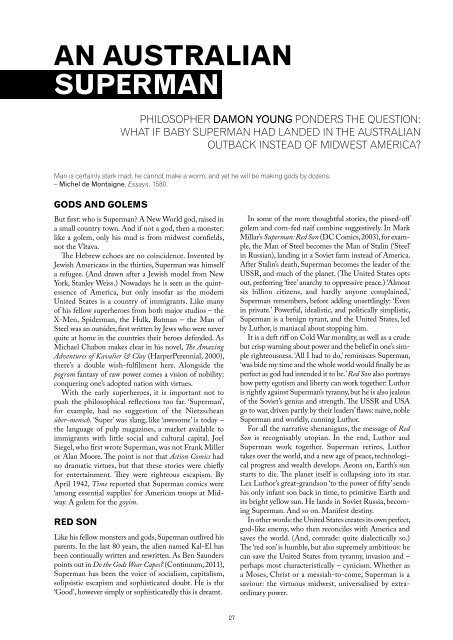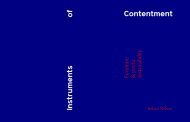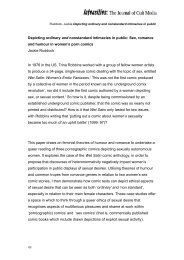AN AUSTRALIAN SUPERMAN
islandsuperman
islandsuperman
You also want an ePaper? Increase the reach of your titles
YUMPU automatically turns print PDFs into web optimized ePapers that Google loves.
<strong>AN</strong> AUSTRALI<strong>AN</strong><br />
SUPERM<strong>AN</strong><br />
PHILOSOPHER DAMON YOUNG PONDERS THE QUESTION:<br />
WHAT IF BABY SUPERM<strong>AN</strong> HAD L<strong>AN</strong>DED IN THE AUSTRALI<strong>AN</strong><br />
OUTBACK INSTEAD OF MIDWEST AMERICA?<br />
Man is certainly stark mad; he cannot make a worm, and yet he will be making gods by dozens.<br />
– Michel de Montaigne, Essays, 1580.<br />
GODS <strong>AN</strong>D GOLEMS<br />
But first: who is Superman? A New World god, raised in<br />
a small country town. And if not a god, then a monster:<br />
like a golem, only his mud is from midwest cornfields,<br />
not the Vltava.<br />
The Hebrew echoes are no coincidence. Invented by<br />
Jewish Americans in the thirties, Superman was himself<br />
a refugee. (And drawn after a Jewish model from New<br />
York, Stanley Weiss.) Nowadays he is seen as the quintessence<br />
of America, but only insofar as the modern<br />
United States is a country of immigrants. Like many<br />
of his fellow superheroes from both major studios – the<br />
X-Men, Spiderman, the Hulk, Batman – the Man of<br />
Steel was an outsider, first written by Jews who were never<br />
quite at home in the countries their heroes defended. As<br />
Michael Chabon makes clear in his novel, The Amazing<br />
Adventures of Kavalier & Clay (HarperPerennial, 2000),<br />
there’s a double wish-fulfilment here. Alongside the<br />
pogrom fantasy of raw power comes a vision of nobility:<br />
conquering one’s adopted nation with virtues.<br />
With the early superheroes, it is important not to<br />
push the philosophical reflections too far. ‘Superman’,<br />
for example, had no suggestion of the Nietzschean<br />
über-mensch. ‘Super’ was slang, like ‘awesome’ is today –<br />
the language of pulp magazines, a market available to<br />
immigrants with little social and cultural capital. Joel<br />
Siegel, who first wrote Superman, was not Frank Miller<br />
or Alan Moore. The point is not that Action Comics had<br />
no dramatic virtues, but that these stories were chiefly<br />
for entertainment. They were righteous escapism. By<br />
April 1942, Time reported that Superman comics were<br />
‘among essential supplies’ for American troops at Midway.<br />
A golem for the goyim.<br />
RED SON<br />
Like his fellow monsters and gods, Superman outlived his<br />
parents. In the last 80 years, the alien named Kal-El has<br />
been continually written and rewritten. As Ben Saunders<br />
points out in Do the Gods Wear Capes? (Continuum, 2011),<br />
Superman has been the voice of socialism, capitalism,<br />
solipsistic escapism and sophisticated doubt. He is the<br />
‘Good’, however simply or sophisticatedly this is dreamt.<br />
In some of the more thoughtful stories, the pissed-off<br />
golem and corn-fed naïf combine suggestively. In Mark<br />
Millar’s Superman: Red Son (DC Comics, 2003), for example,<br />
the Man of Steel becomes the Man of Stalin (‘Steel’<br />
in Russian), landing in a Soviet farm instead of America.<br />
After Stalin’s death, Superman becomes the leader of the<br />
USSR, and much of the planet. (The United States opts<br />
out, preferring ‘free’ anarchy to oppressive peace.) ‘Almost<br />
six billion citizens, and hardly anyone complained,’<br />
Superman remembers, before adding unsettlingly: ‘Even<br />
in private.’ Powerful, idealistic, and politically simplistic,<br />
Superman is a benign tyrant, and the United States, led<br />
by Luthor, is maniacal about stopping him.<br />
It is a deft riff on Cold War morality, as well as a crude<br />
but crisp warning about power and the belief in one’s simple<br />
righteousness. ‘All I had to do,’ reminisces Superman,<br />
‘was bide my time and the whole world would finally be as<br />
perfect as god had intended it to be.’ Red Son also portrays<br />
how petty egotism and liberty can work together: Luthor<br />
is rightly against Superman’s tyranny, but he is also jealous<br />
of the Soviet’s genius and strength. The USSR and USA<br />
go to war, driven partly by their leaders’ flaws: naive, noble<br />
Superman and worldly, cunning Luthor.<br />
For all the narrative shenanigans, the message of Red<br />
Son is recognisably utopian. In the end, Luthor and<br />
Superman work together. Superman retires, Luthor<br />
takes over the world, and a new age of peace, technological<br />
progress and wealth develops. Aeons on, Earth’s sun<br />
starts to die. The planet itself is collapsing into its star.<br />
Lex Luthor’s great-grandson ‘to the power of fifty’ sends<br />
his only infant son back in time, to primitive Earth and<br />
its bright yellow sun. He lands in Soviet Russia, becoming<br />
Superman. And so on. Manifest destiny.<br />
In other words: the United States creates its own perfect,<br />
god-like enemy, who then reconciles with America and<br />
saves the world. (And, comrade: quite dialectically so.)<br />
The ‘red son’ is humble, but also supremely ambitious: he<br />
can save the United States from tyranny, invasion and –<br />
perhaps most characteristically – cynicism. Whether as<br />
a Moses, Christ or a messiah-to-come, Superman is a<br />
saviour: the virtuous midwest, universalised by extraordinary<br />
power.<br />
27




